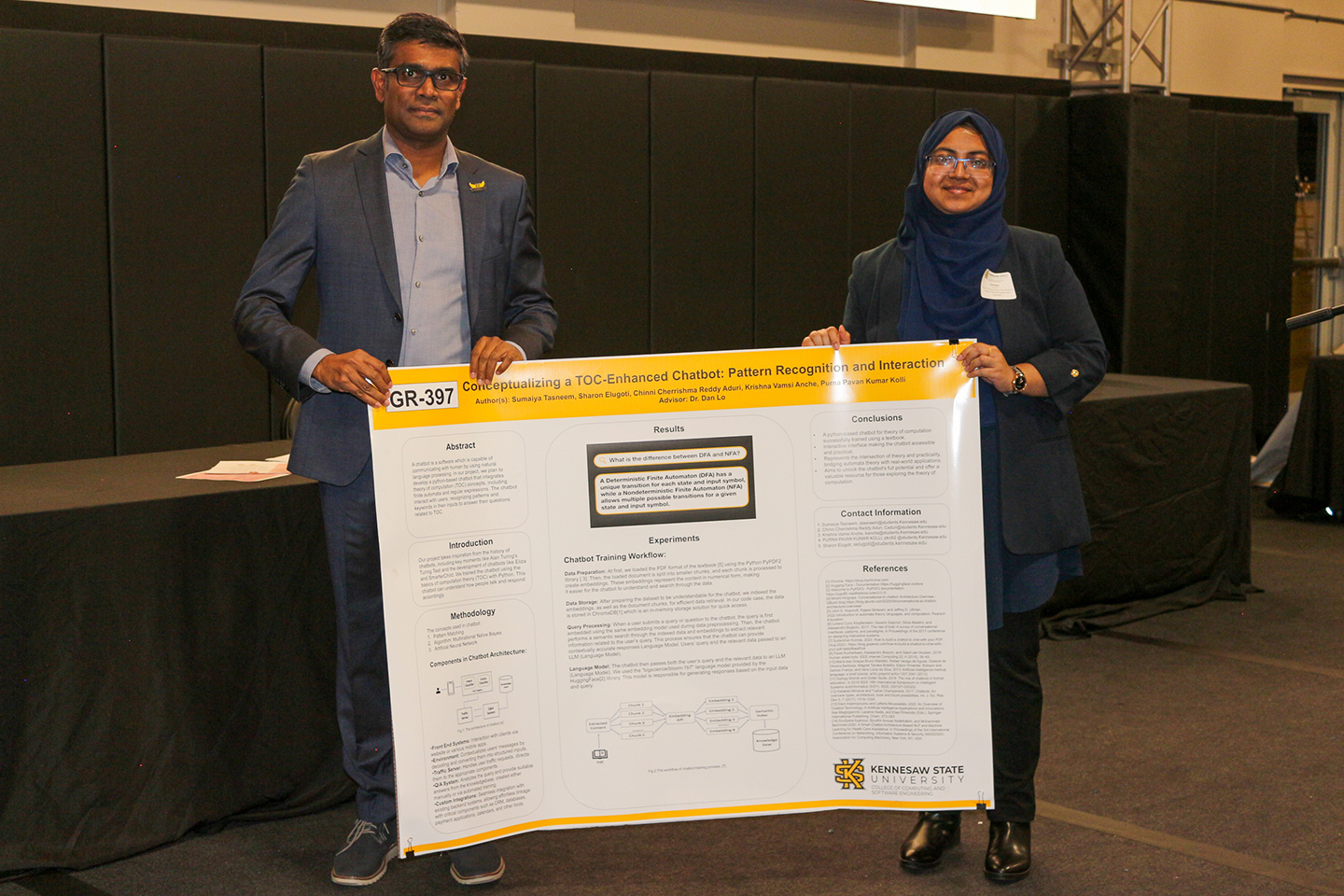Fall 2023 Computing Showcase (C-Day) Winners
Fall 2023 Computing Showcase (C-Day) Winners
Undergraduate Project Winners
UC-400 Electric Vehicle Team (Undergraduate Capstone) by Solon, Brandon A, Klein, Austin D, McMaster, Caleb,
Abstract: The KSU Electric Vehicle Team is developing a fully autonomous electric go-kart to compete in the Autonomous Karting Series (AKS). Our team will be making two programs for the kart’s software stack. These programs include a race line optimizer, which can take the centerline of a track and generate a minimum curvature path for it to follow to get around the track faster, as well as a race controller which can switch navigation algorithms automatically based on the current conditions of the race.
Department: Computer Science
Supervisor: Prof. Sharon Perry
Topics: Artificial Intelligence
Presentation | Poster | More Information
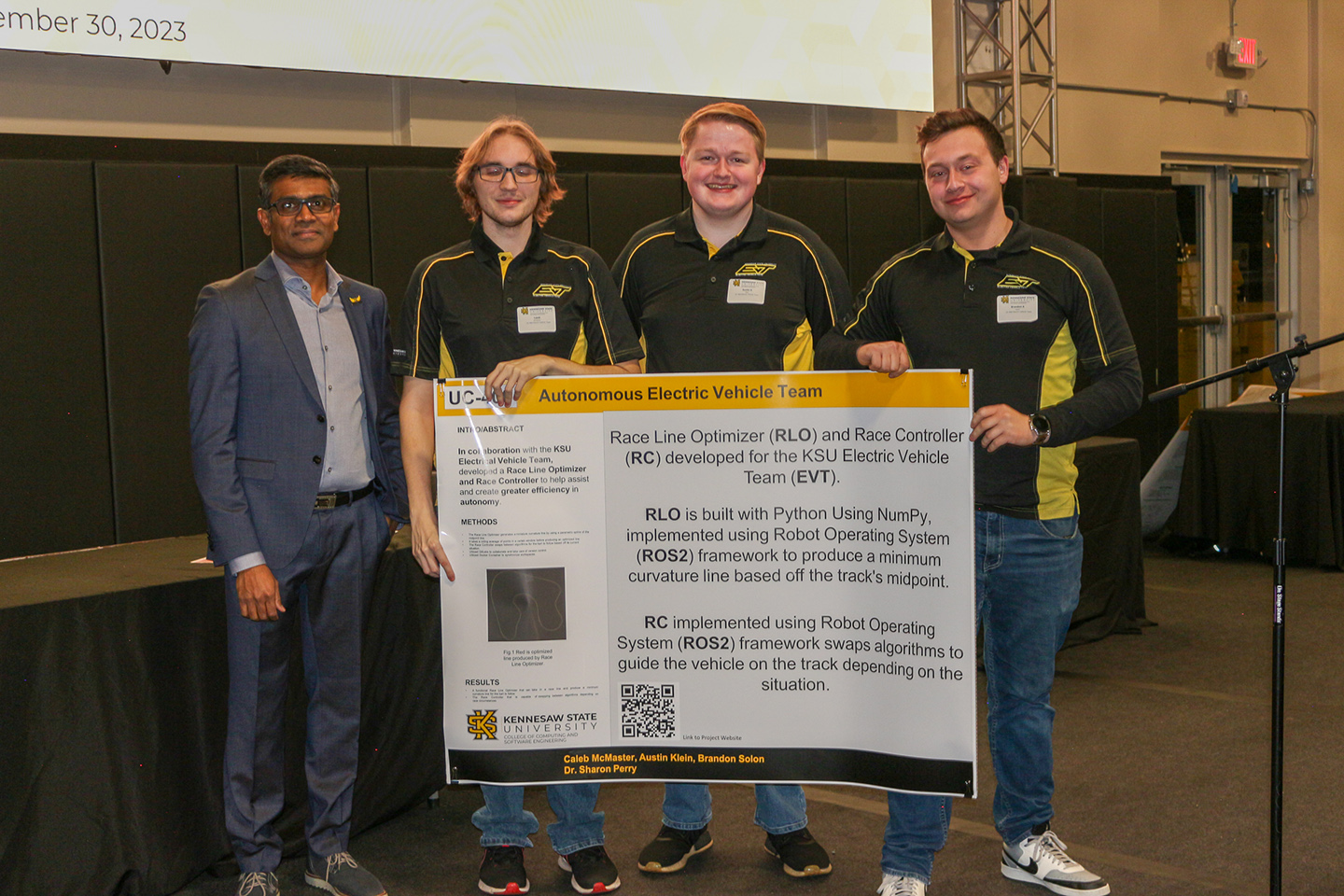
UC-413 I Spy... Water Safety (Undergraduate Capstone) by Robertson, Caden M, Winters, Danny, Jaquez, Denice, Brown, Tahj, L'Hernault, Maksims D,
Abstract: I Spy Water Safety is a game that teaches people about the importance of water safety around a lake. Our goal is to teach people proper water safety etiquette and lower the amount of water-related incidents.
Department: Software Engineering and Game Design and Development
Supervisor: Dr. Yan Huang - SWE Capstone Professor; George McBroom - Sponsor
Topics: Games
Presentation | Poster | More Information
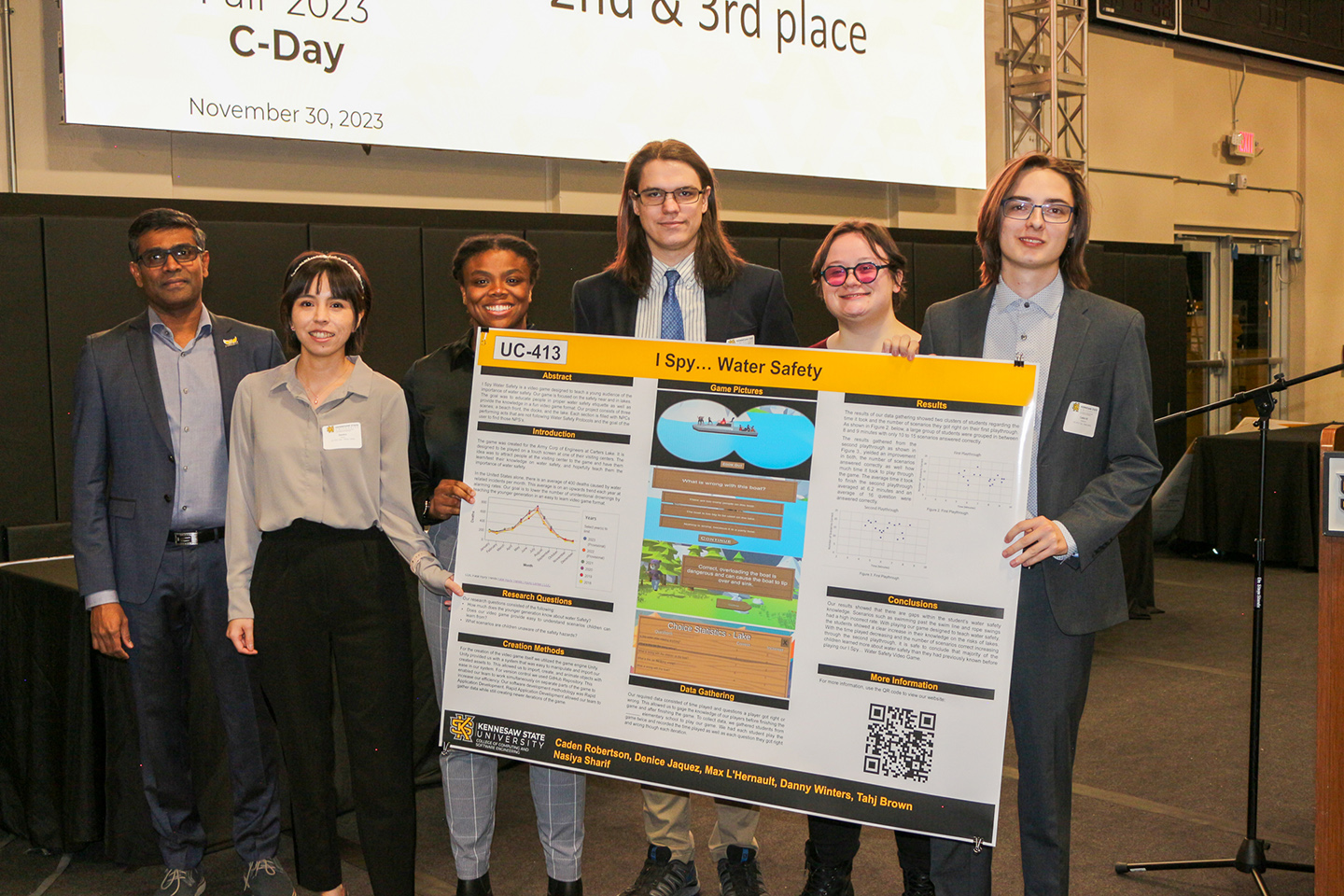
UC-523 IT 4983 Server Hardening (Undergraduate Capsotne) by Chico, Manuel; Vuong, Gilbert; Jones, Harrison; Barbar, George
Abstract: The team was assigned the responsibility of securing a web server. This business website is hosted on a technology stack comprising Apache, MariaDB, Red Hat Linux, and PHP. Our initial task involves conducting a comprehensive assessment of the provided network to identify vulnerabilities and assess potential risks. Subsequently, we will develop a robust security policy plan in alignment with the standards set forth by the National Institute of Standards and Technology (NIST) and industry best practices. Once the plan was approved, our group will proceed to implement the recommended changes to fortify the network, ensuring it complies with industry best security practices. In the final phase, the team engaged in a red/blue team cyber security ethical hacking exercise, involving our network and other team. we will attempt to gain access to other team's server, protect ours by promptly addressing any verified security breach utilizing the team's incident response procedure.
Department: Information Technology
Supervisor: Prof. Donald Privitera
Topics: Security
Presentation | Poster
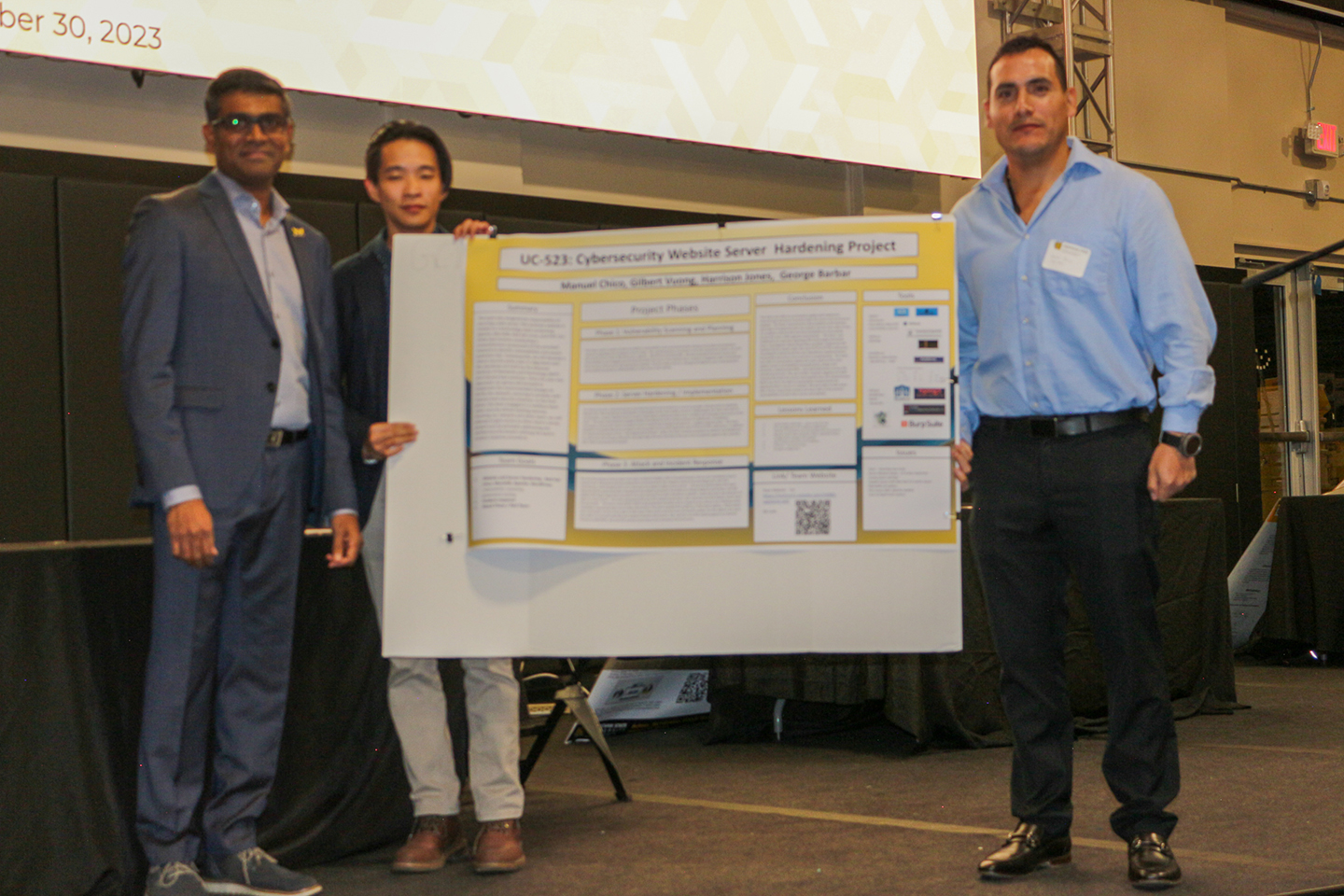
Graduate Project Winners
GC-417 IT Curriculum Success Portal (Graduate Capstone) by Thacker, Alexander, Boakye-Danquah, Cedric, Adeyemo, Damola, Ndiaye, Abdoulaye, Asante, Lydia,
Abstract: In this project, we built a curriculum and course web portal to have all curriculum and course information in one place with easy search and browse interfaces. Currently course data and information are scattered in various places. These include essential information like course description, learning outcomes, sample syllabus, offering schedule and history. It also includes curriculum development information for department use, such as coordinator, developer, revision schedule, open learning materials. We collected all sources of IT course information and built a database to integrate the data in one place. Through this, we can build a complete profile of a course and our curriculum. Then, a data driven interactive web app can pull the data from the database and display all course information to users in dynamic views. This is meant to consolidate a large amount of information about IT courses into one place so students and faculty can easily find the otherwise fragmented information.
Department: Information Technology
Supervisor: Dr. Jack Zheng
Topics: Application Development
Presentation | Poster | More Information
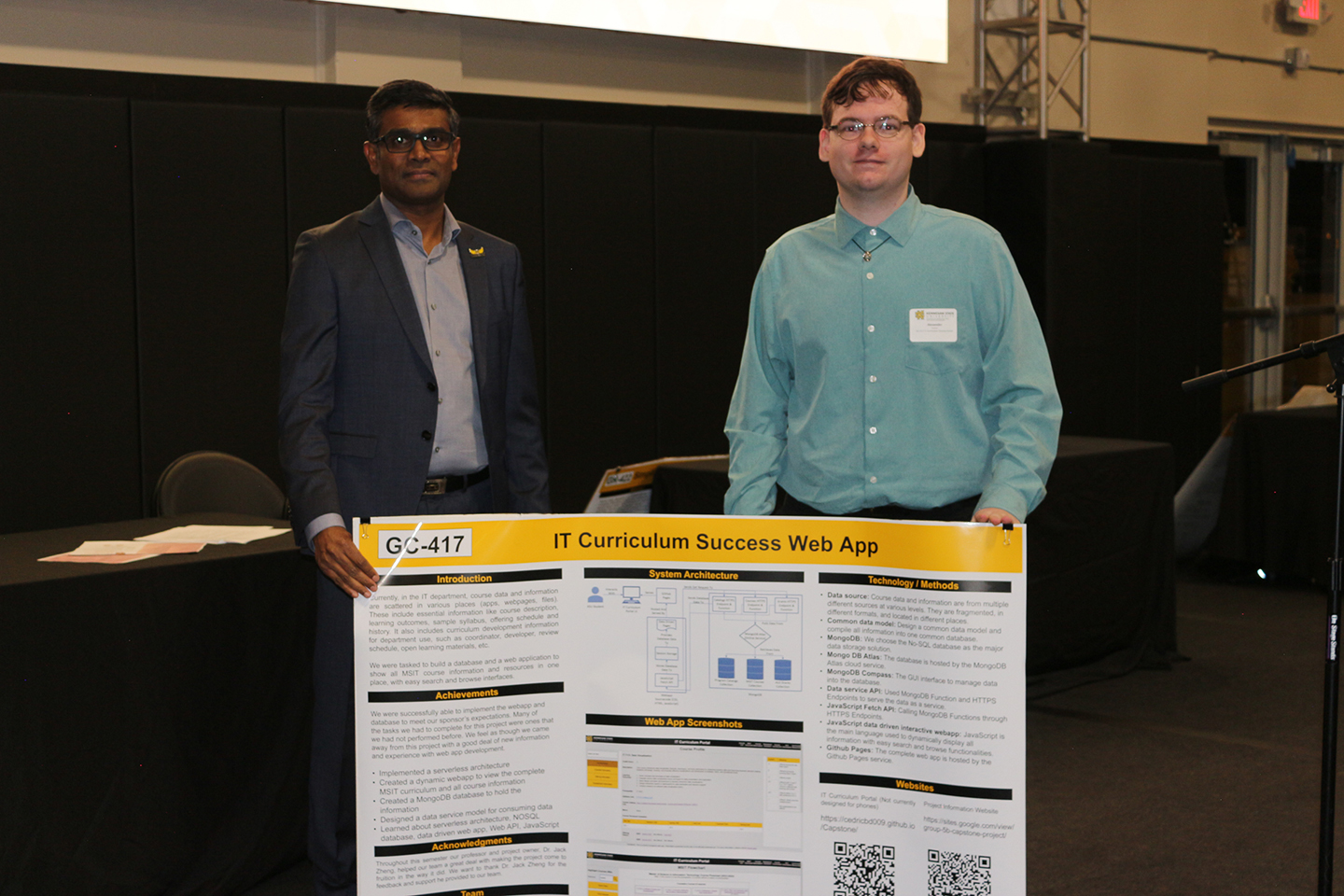
GC-503 Multikernel: A detailed Analysis of Multicore OS Kernel (Graduate Capstone) by Jinan, Umme Afifa,
Abstract: In modern computer systems, multiple processing cores offer immense possibilities to perform parallel and dynamic computing and diversity in architecture. However, such processing creates more challenges as software developers need to design applications that can effectively utilize these multicores for improved performance. Static optimization of such dynamic structures is practically impossible. So, a novel OS structure called multikernel inspired by the distributed systems, is introduced, which will provide superior scalability. In this paper, we briefly review the concept of multikernel OS, analyze and re-evaluate its architecture. Then we introduce some debugging and analysis tools to measure performance of the Windows hybrid kernel. This study will help get a deep insight into existing multikernel-based research, the use of existing analysis tools to measure performance and possible optimization based on analysis results of popular hybrid kernels like Windows.
Department: Computer Science
Supervisor: Dr. Dan Lo (Course Insructor)
Topics: High Performance Computing
Presentation | Poster
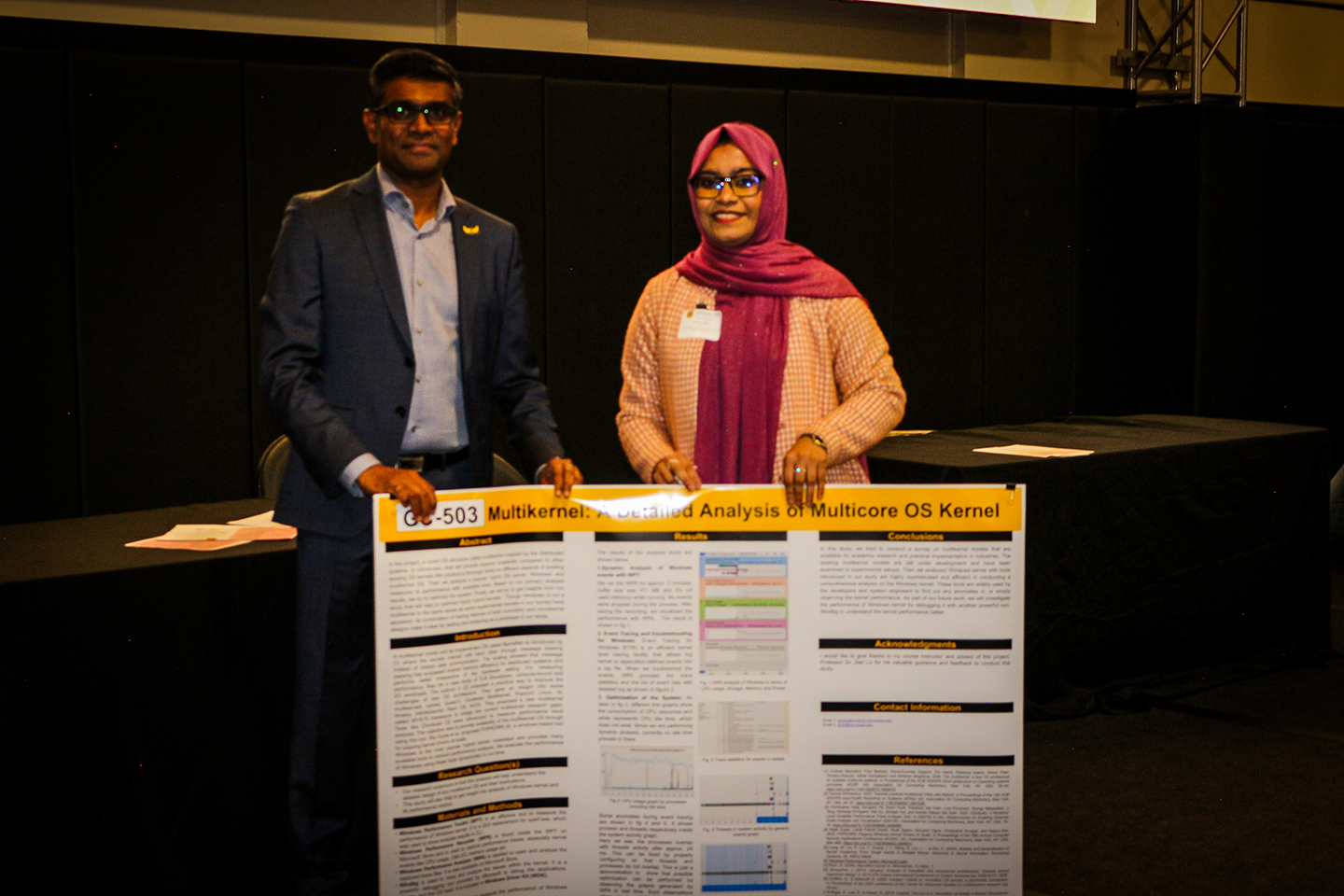
GC-465 Transportation as a Service (Graduate Capstone) by Wear, Frank, Uzoka, Abel, P, Harini, Parsi, Pranavi, owoade, samuel,
Abstract: Personal transportation is shifting away from privately owned vehicles and toward "hired services" to satisfy the same mobility needs. This shift is one of many cultural changes that combine to reduce emissions, improve efficiency, and support an ever-increasing human population. This project supports a shift away from private vehicle ownership as a monolithic solution. Utilizing existing mapping API services, we are planning routes that not only display, but also combine transportation solutions into a single route from origin to destination.
Department: Software Engineering and Game Design and Development
Supervisor: Dr. Reza Parizi
Topics: Application Development
Presentation | Poster
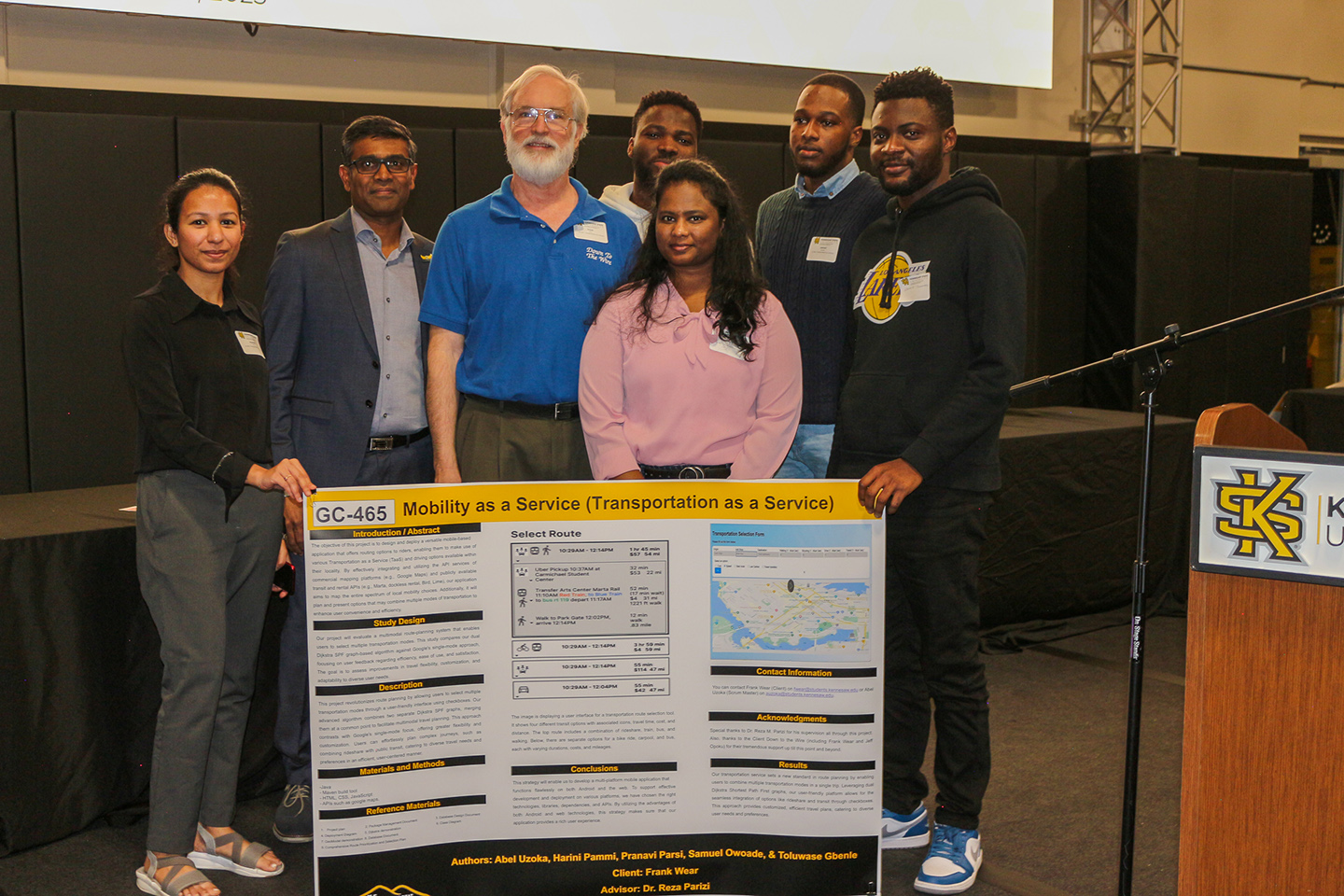
Undergraduate Research
UR-409 Enhancing Aircraft Electronic Warfare Testing with Automated RF Spectrum Analysis (Undergraduate Research) by De Santiago, Anthony, Morgan, Matthew T, Kim, Geonhyeong, Bailey, Jalon L, Reaves, Camille,
Abstract: Military test ranges utilize a variety of Radio Frequency (RF) threat systems, to assess the effectiveness of Electronic Warfare (EW) systems during flight tests. A component of this process involves monitoring RF transmissions. Traditionally, system engineers at Robins Airforce Base have manually analyzed video from spectrum analyzers to confirm properties of specific threat systems. To streamline this analysis, our team's aim was to develop an automated solution for RF spectrum analysis. We employed a custom YOLO V8 model to isolate the analyzer screen and used a novel combination of frame differencing, summing, and agglomerative clustering techniques to extract relevant properties of measured signals. Our resulting application significantly reduces human interaction, enhances accuracy, and allows for the transformation of video data into a digitally manipulatable numeric format.
Department: Software Engineering and Game Design and Development
Supervisor: Project Sponsor: Elizabeth Dayton; Capstone Professor: Dr. Yan Huang
Topics: Artificial Intelligence
Presentation | Poster | More Information
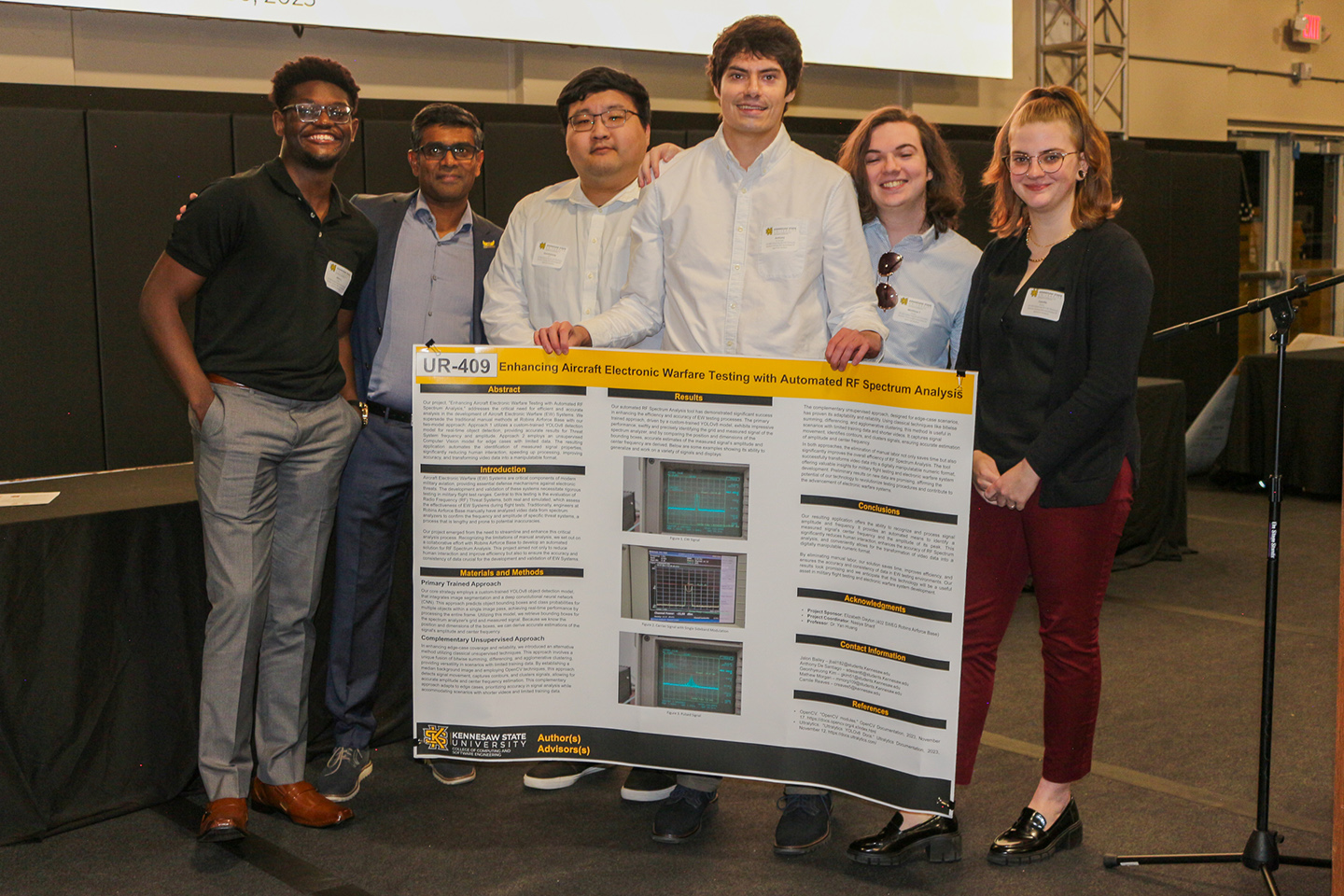
UR-510 Exploring the Impact of Wavelength in Non-Invasive Blood Glucose Monitoring (Undergraduate Research) by Oakley, John E, Kazi, Tahsin,
Abstract: Diabetes and metabolic diseases are some of the most crucial health issues of the 21st century. Monitoring blood glucose, the lead indicator of these diseases is a cumbersome process of constantly drawing blood or using subcutaneous needles. However, new technologies have emerged for non-invasive blood glucose monitoring that uses spectroscopy, which involves emitting light and capturing patient data with cameras. These new devices remove the cost of multiple tests, reduce the risk of skin conditions, and create more patient-friendly solutions. However, the hardware variables of these devices have not been tested thoroughly. One such avenue is via laser wavelength, which substantially affects device performance as different wavelengths interact with skin in varying ways. This study aims to investigate the impact of wavelength on the performance of the team's non-invasive device across different races, genders, and ages of people.
Department: Information Technology
Supervisor: Dr. Maria Valero
Topics: IoT/Cloud/Networking
Presentation | Poster
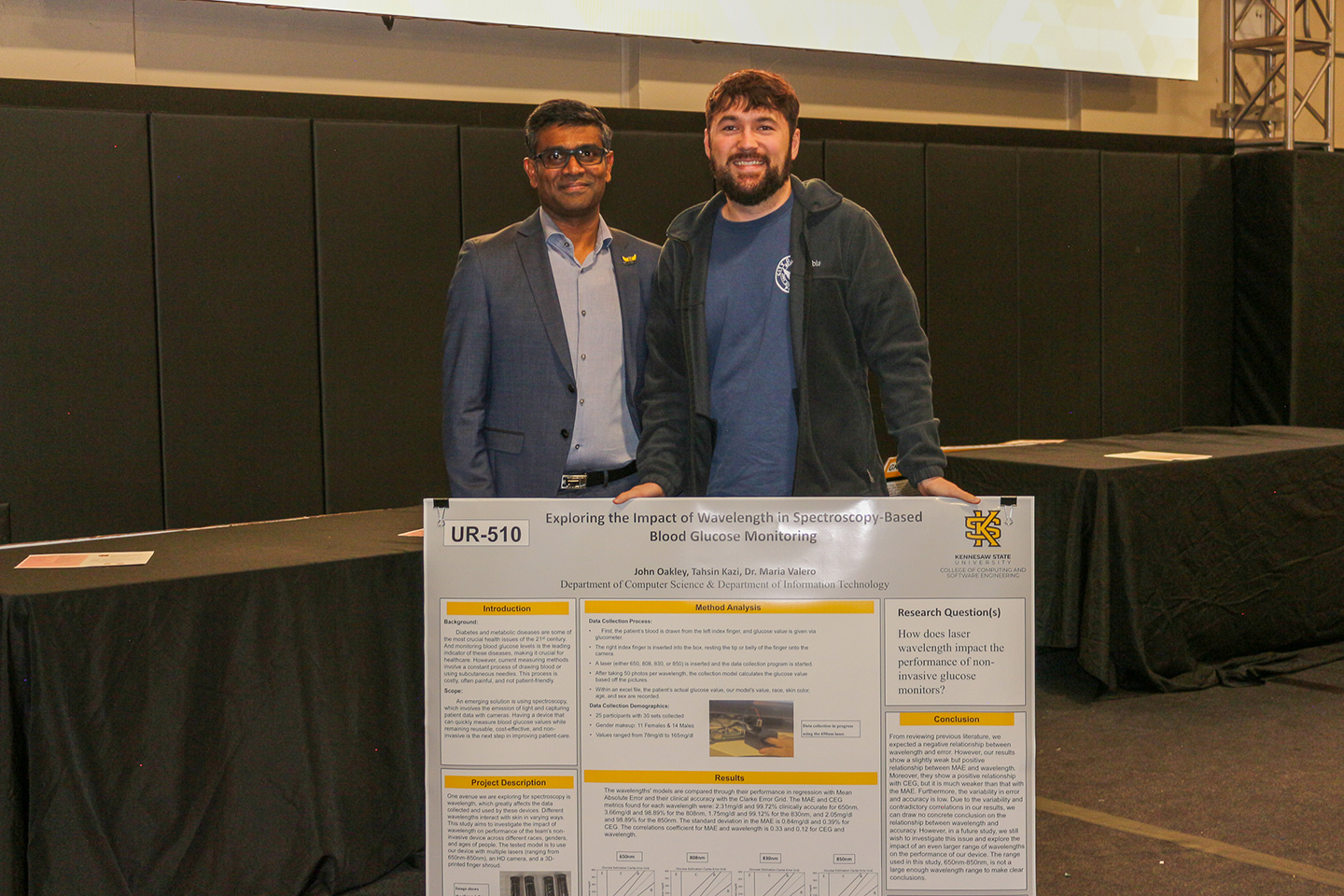
UR-407 Illusion of Weight: The Use of Tactile Glove for Muscle Exercise for Elders
in Virtual Gym Experience (Undergraduate Research) by Autry, Johnathon R,
Abstract: This pilot study aims to investigate the potential creation of the perception of weight through a blend of visual and tactile feedback. Utilizing a tactile glove with varying vibration intensities and virtual dumbbell sizes, the experiment explores multiple conditions. These include tactile intensity (small, medium, large), virtual dumbbell sizes (small, medium, large), and diverse visualizations—ranging from no virtual dumbbell with or without tactile feedback to scenarios including both virtual dumbbells and tactile feedback. The study evaluates the virtual reality exercise experience and real performance using EMG sensors to measure muscle response, Heart Rate (HR), Galvanic Skin Response (GSR), and hand tracking. These biometric indicators enable a comprehensive understanding of the physiological and experiential impact of different conditions. The findings will provide insights into the efficacy of combined visual and tactile feedback in simulating weight perception.
Department: Software Engineering and Game Design and Development
Supervisor: Dr. Sungchul Jung - Project Supervisor; Dr. Garret Hester - Physical Therapy
and Health Expert; Prof. Lei Zhang - VR/AR Subject Expert
Topics: Games
Presentation | Poster
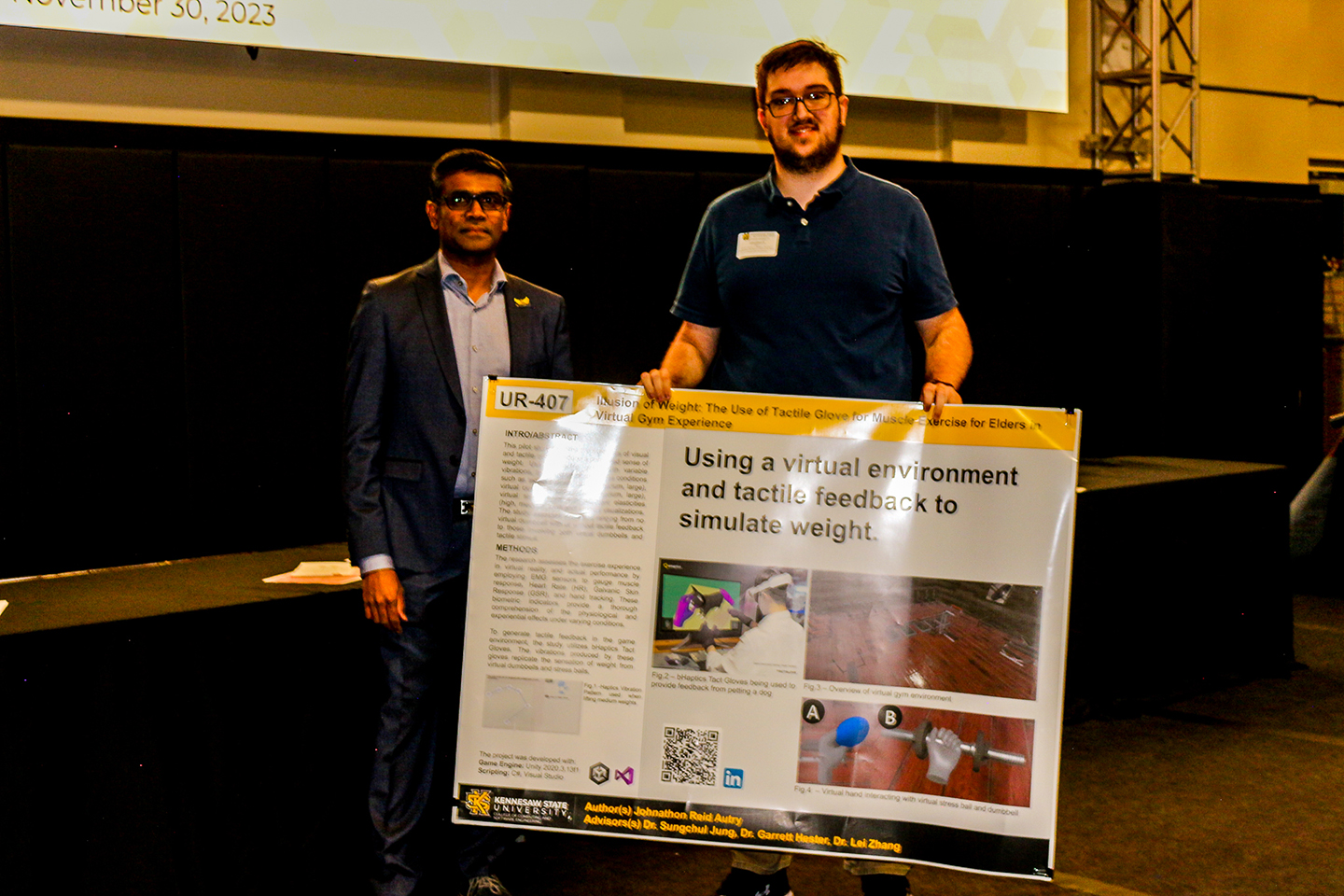
Graduate Research
GR-434 Phase Estimation’s Application in QRAM (Graduate Research) by Hunt, Ethan K,
Abstract: The paper proposes a new novel way of creating QRAM through quantum phase estimation. This is done by mapping a monotonically increasing sequence of natural numbers to a binary series and, ultimately, to a characteristic constant η which is then encoded as a phase in a quantum state. This process leverages quantum phase estimation, a fundamental quantum algorithm for finding the eigenvalues of a unitary operator which can be used as a form of QRAM in either Quantum or Hybrid models of computing
Department: Computer Science
Supervisor: Dr. Dan Lo
Topics: High Performance Computing
Presentation | Poster
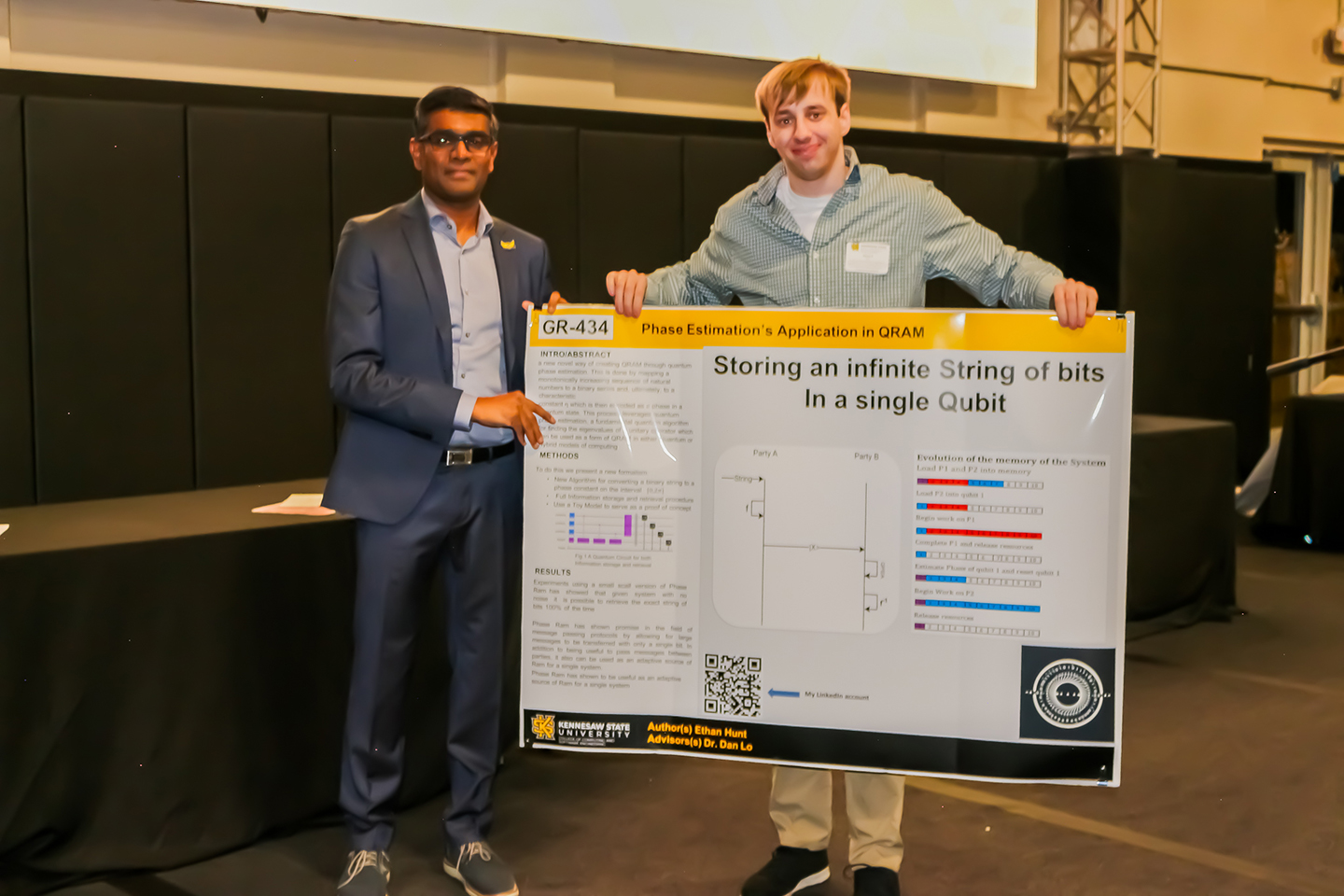
GR-519 Meditation as an intervention to improve Student Attention An EEG study based
on Machine learning prediction and Spectral Ratio Analysis (Graduate Research) by Gopi, Sreekanth,
Abstract: This research aims to develop a machine learning model using EEG data to identify student inattention, serving as an early intervention tool. Attention deficit, influenced by social media, adversely affects student performance. ADHD, characterized by inattention, hyperactivity, and impulsivity, is linked to academic challenges. Early detection in academics is crucial. A Machine Learning model was designed, and trained on an attention dataset with 34 EEG recordings of young adults. The raw EEG data was pre-processed and filtered, ICA was applied, and spectral analysis was done. Guided meditation with music was developed as an intervention to improve attention. EEG recordings from 15 young adults during a visual reasoning test assessed the model's efficacy by comparing model output to test scores. The ML model achieved a 98% accuracy rate in classifying attention vs inattention states.
Department: Computer Science
Supervisor: Dr. Nasrin Dehbozorgi
Topics: Data/Data Analytics
Presentation | Poster
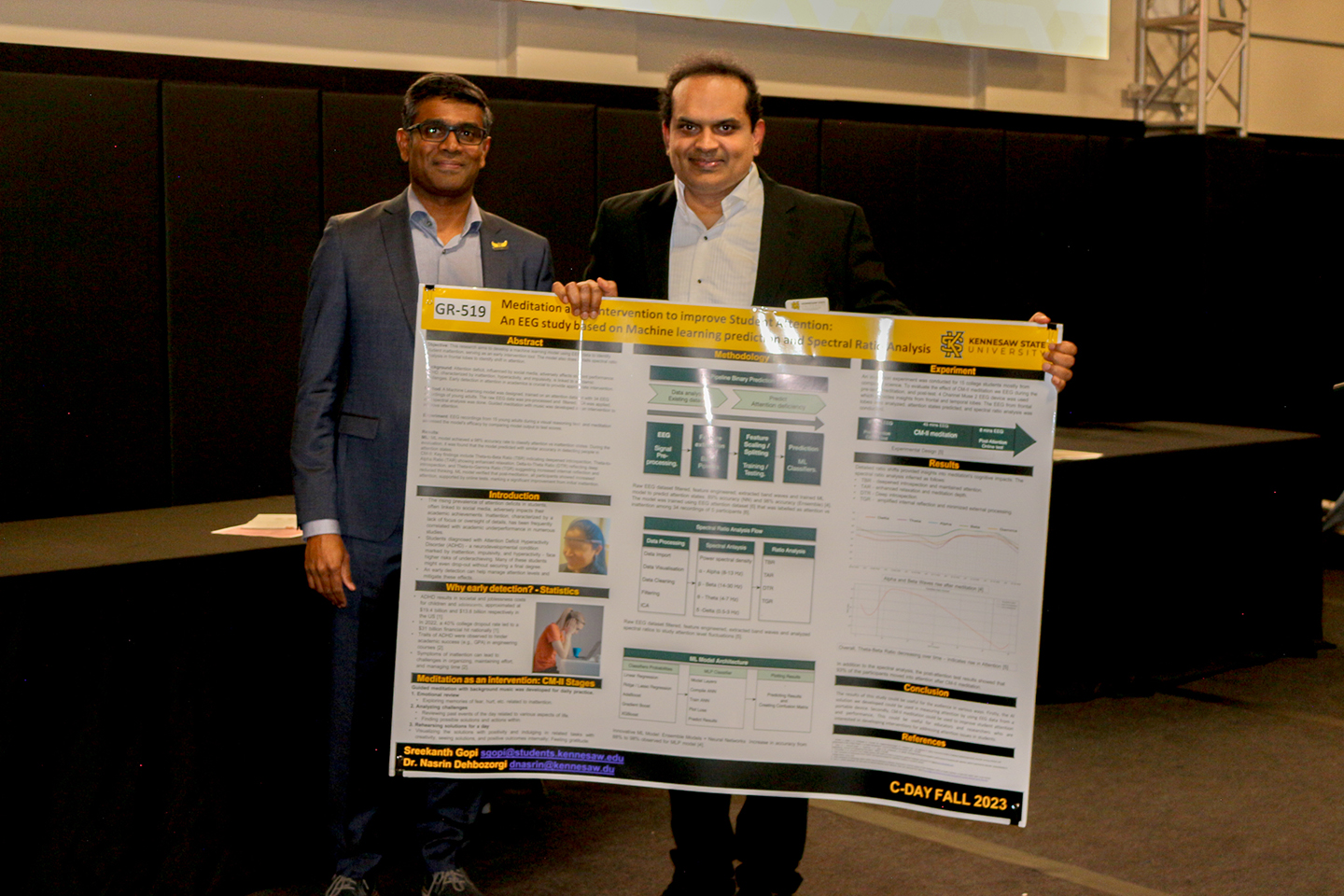
GR-397 Conceptualizing a TOC-Enhanced Chatbot: Pattern Recognition and Interaction (Graduate Research) by Tasneem, Sumaiya, ELUGOTI, SHARON, Aduri, Chinni Cherrishma Reddy, KOLLI, PURNA PAVAN KUMAR, Anche, Krishna Vamsi,
Abstract: A chatbot is a software which is capable of communicating with human by using natural language processing. In our project, we plan to develop a Python-based chatbot that integrates theory of computation (TOC) concepts, including finite automata and regular expressions. The chatbot will interact with users, recognizing patterns and keywords in their inputs. We’ll begin by defining initial regular expressions for basic user interactions including greetings and inquiries.Future developments may enhance regular expressions and broaden the chatbot’s TOC-related capabilities, creating a versatile educational tool with practical TOC applications.
Department: Computer Science
Supervisor: Dr. Dan Lo
Topics: Artificial Intelligence
Presentation | Poster
